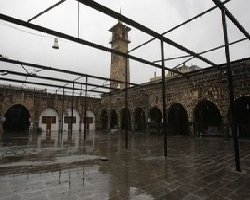Syria has deployed security forces to the northern city of Latakia after violent protests left there at least 12 people dead and more than 150 injured amid calls for reform.
Troops patrolled the streets of Latakia - a religiously diverse port city 350km northwest of the capital, Damascus - in force on Sunday, in response to a wave of unrest that has put president Bashar al-Assad under unprecedented pressure.
Dozens of pro-reform protesters have been killed in similar clashes in towns and cities across the country, including the city of Daraa and nearby Sanamin.
In Sanamin, the relatives of those killed in clashes on Friday said their loved ones had been demonstrating peacefully and that security forces killed at least 10 people there.
However, Bouthaina Shaaban, an adviser to the president, told Al Jazeera's Cal Perry that "what happened in Sanamin, it was not a protest, it was not a demonstration, it was a group of about 10 people who attacked a police station".
"They [then] went to a military station and were firing at the guards. And so obviously the guards, it's their duty to protect their military station. And here is where firing began and unfortunately there were victims there," she said.
The competing claims came as Syrian authorities announced they would end decades of emergency rule in the country.
Shaaban told Aljazeera correspondent that the law would "absolutely" be lifted, but she failed to give a timetable.
The repeal of the emergency law, in place since the 1963 coup that brought the Baath Party to power, has been a key demand of protesters demanding greater political freedoms.
Reforms announced
The emergency law imposes restrictions on public gatherings and movement and authorizes the arrest of "suspects or persons who threaten security".
It also authorizes the interrogation of any individual and the surveillance of personal communication as well as official control of the content of newspapers and other media before publication.
The state also announced a series of reforms, including the release of detainees and plans to form new laws on the media and licensing political parties.
"There are many issues which were decided, and which are being followed up with the president and the government," Shaaban said.
Pressed on when reforms would be implemented, she said that "one or two steps in the implementation [of reforms]" would be announced within a week.
Aljazeera correspondent said the move to lift the emergency law would go some way towards appeasing the protesters' demands.
"It will open up press freedom and political freedom. This is something that people have been calling for on the streets. Certainly it is a concession on the government's part," he said.
The unrest across Syria has put enormous pressure on Assad, who succeeded his father Hafez on his death in 2000, and the 45-year-old president is expected to make a public address in the days to come.
Deadly violence has also gripped cities in southern Syria for weeks. On Saturday, demonstrators torched the Baath party's local headquarters in the southern town of Tafas.
Nationwide, officials say more than 30 people have died since the unrest began earlier this month.
But activists have said that more than 126 people have already died in protest violence, with upwards of 100 killed on Wednesday alone in a crackdown on protests in Daraa, a southern tribal town that has become the symbol of the dissent.
In London, the Syrian Observatory for Human Rights released a list of 41 names of people reportedly detained by authorities on Friday. Amnesty International has issued a list of 93 people it says have been detained. And Reuters media on Sunday reported that two of its journalists in the country were missing.
But in a move said to be aimed at placating protesters, Syrian authorities on Sunday released a lawyer - Diana Jawabra - along with 15 others who were arrested for taking part in a silent protest demanding the release of children detained for scrawling graffiti inspired by pro-democracy protests across the Arab world.
This followed news of the freeing of 260 political prisoners.
Assad faces calls to curb a pervasive security apparatus, free political prisoners and reveal the fate of tens of thousands of dissidents who disappeared in the 1980s.
PHOTO CAPTION
A picture taken under Syrian security supervision shows the Omari mosque -- which for one week has served as the headquarters of an anti-regime movement -- in the southern city of Daraa.
Al-Jazeera


 Home
Home Discover Islam
Discover Islam Quran Recitations
Quran Recitations Lectures
Lectures
 Fatwa
Fatwa Articles
Articles Fiqh
Fiqh E-Books
E-Books Boys & Girls
Boys & Girls  Ramadan
Ramadan Fatwa Audios
Fatwa Audios Month of Mercy
Month of Mercy Women
Women Eed Al- Fitr
Eed Al- Fitr Food Recipes
Food Recipes Videos
Videos

 Prayer Times
Prayer Times












